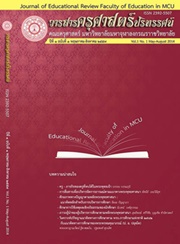Analysis of Educational Philosophy Based on the National Education Act, B.E. 2542 and the Educational Concept of Phrabrahmagunabhorn (P.A. Payutto)
Main Article Content
Abstract
Phrabrahmagunabhorn (P.A. Payutto) is a Buddhist scholar who can offer a wholistic guideline on the sustainable education management based on Buddhism in the meaning of education, aim of education, teaching and learning process and teaching and learning activities. It is apparently showed that Buddhism is a religion of true education because education is consistent with Buddhism and both proceed in the same direction.
An analysis of educational philosophy in the National Education Act B.E. 2542 and the educational concept of Phrabrahmagunabhorn (P. A. Payutto) is based
on 4 aspects: 1) meaning of education, 2) the aim of education, 3) the principles of education, and 4) the education management process, in order to find similar and dissimilar concepts in education.
Article Details
ทัศนะและความคิดเห็นที่ปรากฏในบทความในวารสารฉบับนี้ถือเป็นความรับผิดชอบของผู้เขียนบทความนั้นเพียงผู้เดียว และไม่ถือเป็นทัศนะและความรับผิดชอบของกองบรรณาธิการ
กองบรรณาธิการขอสงวนสิทธิ์ในการคัดเลือกบทความลงตีพิมพ์และจะแจ้งให้เจ้าของบทความทราบหลังจากผู้ประเมินบทความตรวจอ่านบทความแล้ว
ต้นฉบับที่ได้รับการตีพิมพ์ในวารสารครุศาสตร์ปริทรรศน์ คณะครุศาสตร์ มหาวิทยาลัยมหาจุฬาลงกรณราชวิทยาลัย ถือเป็นกรรมสิทธิ์ของคณะครุศาสตร์ มหาวิทยาลัยมหาจุฬาลงกรณราชวิทยาลัย ห้ามนำข้อความทั้งหมดหรือบางส่วนไปพิมพ์ซ้ำ เว้นเสียแต่ว่าจะได้รับอนุญาตจากมหาวิทยาลัยฯ เป็นลายลักษณ์อักษร


